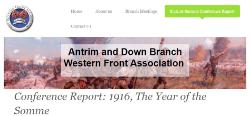 On 8th October 2016 the Antrim and Down branch of the WFA held its annual conference on the history, legacy and importance of political and military events during 1916. Twenty-nine people attended.
On 8th October 2016 the Antrim and Down branch of the WFA held its annual conference on the history, legacy and importance of political and military events during 1916. Twenty-nine people attended.
Dr Tim Bowman (University of Kent) opened the conference with a broad overview of political and military events during 1916. He said that while much public attention in Northern Ireland had focused on the 1916 Easter Rising and 1st July these were only two events in a global war. He listed other major episodes including the titanic Battle of Verdun, fought between Germany and France and the five battles of the River Isonzo, where Italy repeatedly attacked Austria-Hungarian positions along that river.
Dr William Butler (University of Kent) followed talking about recruitment in Ireland and the various attempts, propaganda and initiatives the military authorities used to try and increase enlistment amongst Irishmen in the second half of the war.
PhD candidate Heather Montgomery (Queen’s University Belfast) finished the morning session with a discussion on research into the nature and type of infantry training conducted at Great War army camps across Ireland. She explained how she had used archeological techniques examine landscape features in training camps which could possibly be training trenches but were not recorded on official maps or plans. She had uncovered extensive networks of previously unknown practice and assembly trenches and concluded that the army training efforts to prepare soldiers for combat in France was much more sophisticated and extensive than had been previously believed.
Professor Richard Grayson (Goldsmiths, University of London) opened the afternoon session. He talked about recruitment and military service of men from West Belfast arguing that their experience was much more complex than popular perceptions suggested.
He was followed by Nicholas Perry who examined the relationships that Major General Oliver Nugent, Commander of the 36th Ulster Division from 1915 to 1918, had with the commanders of Armies in which his division was deployed during his command.
The final speaker of the day was Professor Andrew Lambert (King's College London) who discussed the importance of the Battle of Jutland. He said the Battle was the only major naval battle of World War One, and the only full-scale fleet engagement between Dreadnought battleships. Although the Royal Navy lost more men and ships, the final verdict of the Battle of Jutland was that the German High Seas Fleet had been defeated and driven back into port, unable to face the superior firepower of the Grand Fleet. Admiral Sir John Jellicoe’s tactics were criticised by some, but after the battle the Royal Navy retained command of the sea, upon which the entire allied war effort depended. The German response to their defeat was unrestricted U-boat warfare, a massive violation of international law, which helped bring the United States into the conflict.
The final element of the conference was a visit of HMS Caroline, the last surviving warship that fought at Jutland. The ship has been recently opened to the public and the conference was given a tour around the ship by Curator Victoria Millar.
The Antrim and Down Branch would like to thank Somme Belfast 100, Living Legacies 1914-18 public engagement centre and PRONI for their assistance and support that helped make this conference possible.
Tom Thorpe
Co Chair
12.10.2017
